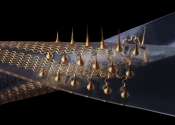Dissolving implantable device relieves pain without drugs
A Northwestern University-led team of researchers has developed a small, soft, flexible implant that relieves pain on demand and without the use of drugs. The first-of-its-kind device could provide a much-needed alternative ...
Jun 30, 2022
0
425









